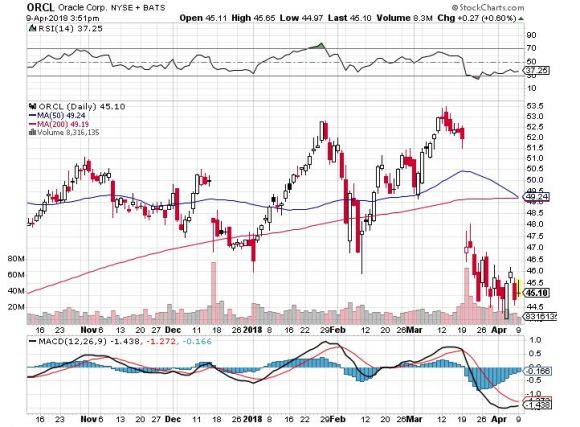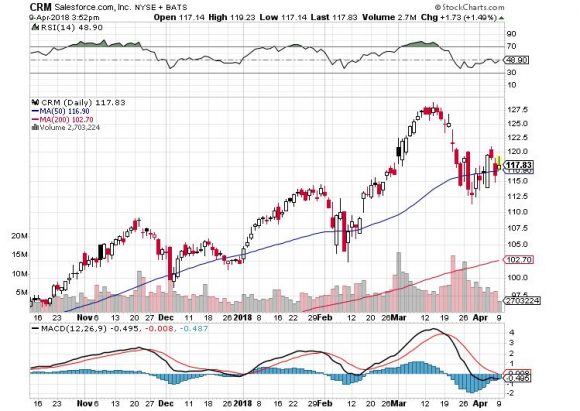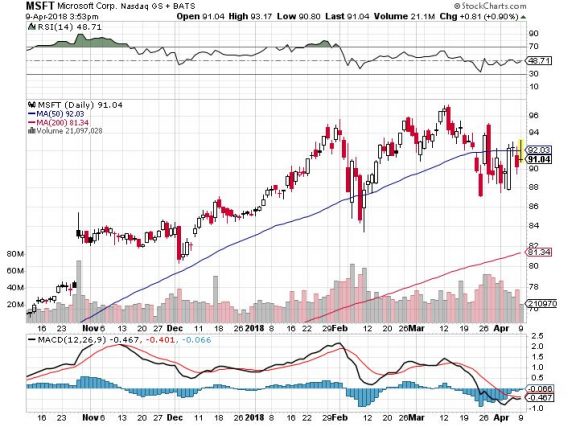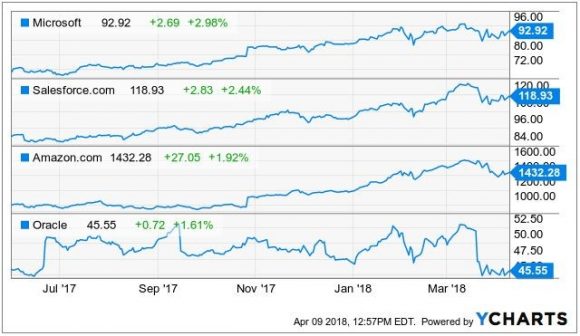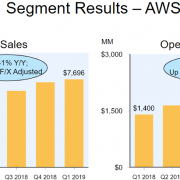Why I'm Passing on Oracle
To say 2018 is the Year of the Cloud is an understatement.
Oracle (ORCL) felt the tremors of investors' fickle preference for quality cloud growth when the stock sold off hard after earnings that were relatively solid but unspectacular.
Oracle is a Silicon Valley legacy firm established in 1977 under the name of Software Development Laboratories. The company was co-founded by Larry Ellison, Bob Miner, and Ed Oates and the name later was changed to Oracle.
The company made its name through database software and still relies on it for the bulk of its $37 billion in annual revenue.
Legacy companies are put through the meat grinder by investors, and analysts are micro-sensitive to just a few narrow-defined metrics.
Not all cloud companies are treated equally.
It has become consensus that the only way to move forward is through advancing the cloud model, and neglecting this segment is a death knell for any quasi-cloud stock.
Oracle skirted any sort of calamitous earnings performance but left a lot to be desired.
Cloud SaaS (software-as-a-service) revenue for the quarter was $1.2 billion, up 21% YOY, and growth rates were in line with many that are part of the winners' bracket.
Oracle's overall cloud business is still a diminutive piece of its overall business constituting just 16%, which is incredibly worrisome.
This number accentuates the lack of brisk execution and its late entrance into this industry.
Gross cloud margin only increased 2% to 67%, up from 65% QOQ, providing minimum incremental growth.
Total cloud revenue guidance was substantially weak, which includes SaaS, PaaS (platform-as-a-service) and IaaS (infrastructure-as-a-service) expected to grow 19% to 23% in 2018, much less than the forecasted guidance of 27%.
Oracle should be growing its cloud segment faster, especially since its cloud business is many times smaller than competition, and growing pains habitually occur later in the growth cycle.
The outsized challenge is attempting to leverage its foundational database business to convince existing corporate clients to adopt Oracle's in-house cloud services instead of diverting capital toward cloud offerings from Microsoft (MSFT), Salesforce (CRM), or Amazon (AMZN).
It could be doing a better job.
Weak guidance of 1%-3% for annual total revenue topped off a generally underwhelming cloud forecast.
The lack of over-performance is highly disappointing for a company that has been touting its pivot to cloud.
The message from Oracle is the transformation is nowhere close to finished. That was investors' queue to stampede for the exits.
Investors only need to look a few miles up the coast at the competition.
Salesforce is putting up solid numbers, and many cloud companies are judged solely on a relative basis to the industry leaders.
The turnaround companies are getting crushed by these growth magnates. Salesforce is sequentially increasing total revenue over 20% each quarter and expects total revenue to rise more than 20% in 2019. It has set ambitious revenue targets for 2020, 2030, and 2040.
Microsoft Azure grew cloud revenue 98% QOQ, and Microsoft Windows, its legacy business, only makes up 42% of Microsoft's total revenue and is shrinking by the day.
Microsoft has earned its positon as the King of the Legacy Businesses offering proof by way of its position as the industry's second-best cloud company, engineering cloud quarterly revenue of $7.8 billion and gaining on Amazon Web Services (AWS).
Microsoft was in the same situation as Oracle a few years ago, stuck with a powerful business in a declining industry. It then turned to the cloud and never looked back.
Instead of leveraging databases, Microsoft leveraged its operating system and proprietary software to persuade new clients to adopt its cloud platform - and the numbers speak for themselves.
Oracle still has the chance to pivot toward the cloud because its database product is a brilliant entrance point for potential cloud converts.
In the meantime, Amazon has its sights set on Oracle's database product and plans to go after market share.
Oracle believes its database product is the best in the business - more affordable, quicker, and dependable. However, technology is evolving at such a rapid pace that these nimble companies can flip the script on their opponents in no time.
It's a dangerous proposition to compete with Amazon because of the nature of competing means dumping products, and unlimited cash burn battering opponents into submission by crushing profitability.
Oracle's margins would get hammered in this circumstance at a time when Oracle's gross margins have been a larger sore spot than first diagnosed.
Legacy companies are unwilling to enter price wars with Amazon because they still have dividends to defend and profit margins to nurture skyward.
Concurrently, Salesforce and Microsoft Dynamics CRM are attacking Oracle's CRM products (Customer Relationship Management), which could further impair margins.
The breadth of competition showed up to the detriment of margins with PaaS and IaaS gross margins eroding from 46% YOY, down to 35% YOY.
Microsoft's cloud revenue eked out a better than 60% gross margin even with its gargantuan size.
Investors punished Oracle for whispers of its cloud business plateauing with a size that is just a fraction of Microsoft Azure.
The leveling out is hard to take after Larry Ellison claimed cloud margins would soon breach 80% in upcoming quarters.
Conversely, Microsoft has claimed margins could start to erode as the company reallocates capital into expanding its cloud infrastructure, but it is understandable for maturing companies that must battle with the law of large numbers.
At the end of the day, Oracle's cloud business is failing to grow enough.
Oracle's competitors are speeding down the autobahn while Oracle has been dismissed to the frontage road.
Growth impediments with the small size of Oracle's cloud business is a red flag.
Avoid this legacy turnaround story that hasn't turned around yet.
Oracle looks like a value play at this point and could rise if it gets its cloud act together or the mere anticipation of a resurgence.
But with margins and competition pressuring its attempts at transformation, I would take a wait-and-see approach.
It's clear that Oracle is in the third inning of its turnaround, and teething problems are expected.
If you get the urge to suddenly buy cloud stocks, better look at any dip from Microsoft, Salesforce, and Amazon, which all directly compete with Oracle but are performing at a much higher level.
__________________________________________________________________________________________________
Quote of the Day
"A company is like a shark, it either has to move forward or it dies." - said Oracle co-founder Larry Ellison.

